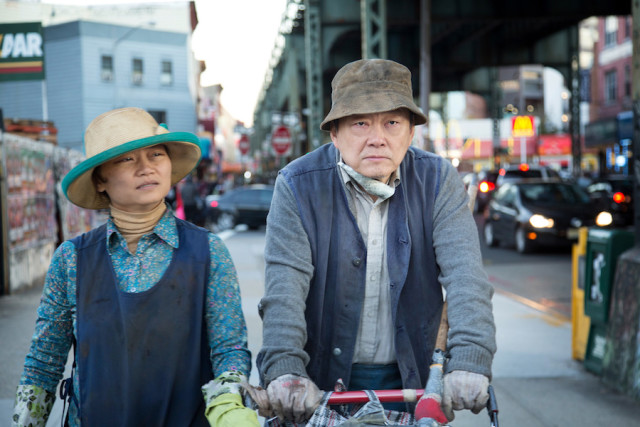
A baby plays in the living room of a Brooklyn brownstone while her mother tells The Guy about their trip to Montauk and the tick that bit her daughter. She laments about how they didn’t even really want to go, and now a tick will “murder” their daughter. “Don’t blame the tick, babe,” her husband responds, “It’s the Lyme Disease inside the tick that will kill our daughter.”
“Like a ticking time-bomb,” The Guy interjects with a grin at the pun. But is it a pun, The Guy? IS IT REALLY???
Though the title of this week’s episode “Tick”appears to directly reference that anecdote, The Guy’s word-association is a more appropriate interpretation for this episode. Through the juxtaposition of families, generations, relationships and even objects and technology, this episode presents a meditation on time, how the passage of it affects us all, and what we can and should expect waiting for us.
While it might seem downright morbid to think about time in relation to us (it keeps going, we don’t), and how one day it is we who will be out of touch with current trends and our own children, there’s a positive message in the image of recycling throughout the episode. Yes, it’s depressing to think about growing old and being out of touch, and more depressing that your attempts to hold onto youth are mocked, but it’s still possible to regain your youth and be transformed into something new, even if it means smoking weed and going to day raves. It’s possible to be recycled into something new, and it’s also possible to find a community of people who don’t care that you’re an Old who sometimes says “Ha-cha-cha-cha!”
We begin the cycle in the apartment of Quinn (Bridget Moloney) and her husband (Paul Thureen), and Quinn’s unseen father Jim (Peter Friedman), but the story doesn’t really start there. It begins when The Guy takes out the recycling (brief aside: is he the ideal houseguest? He’s more thoughtful at a stranger’s house than I am at my friends’ places), which is then picked up by Wei (Clem Cheung). We now follow Wei’s path to meet his wife Joon (Kristen Hung), who is also collecting recyclables. Wei and Joon’s story is as New York as it gets, as the sight of people with shopping carts picking out the cans and recycling bags from garbage cans is a staple here. This is their main source of income, and it’s apparently enough to keep them living in a modest apartment.
________
Wei and Joon’s story is less of a story than a slice of life, but it’s the kind of view the show traffics in, giving us the human side to a very New York phenomenon that we don’t often give a second thought to. What it also does is set up the two seniors against Jim, another older person who will appear later. Wei, the first senior we meet, is entirely anti-change. Joon, the next one we meet, has accepted change and is trying her best to keep up, albeit with moderate success. And then there’s Jim, who has thrown himself completely into the changing times. He looks back at his youth as wasted entirely on his corporate job, and seizes on anything new. These are the paths that we’ll all eventually face.
In the first vignette, we learn that Wei is a man who doesn’t need much. He wears a poorly fitting suit and plays an old radio for amusement. We see how he is resistant to any change. When he and his wife meet their son and his girlfriend, he refuses to speak in English and won’t accept their son’s help, taking the form in this instance of first-class tickets to Germany to visit them, even though they were bought with points. As someone who has never even flown with extra legroom, I died a little inside watching this. Take the tickets, dude!
Joon, however, is more adventurous, more progressive. She’ll try free energy drinks that are being handed out, even if she winds up only pouring them out to get the cans, and she immediately takes to the new iPhone that her son and his girlfriend have given them. Wei’s reaction? He’s going to try to sell it at the Fulton Mall. It’s a short glimpse into their lives that illustrates a man fighting against the times. His son, who used to perform on the erhu with him on the subway platform, has graduated to the theremin, which is basically like the Dippin’ Dots of instruments: no matter what year, it will always feel futuristic. His wife is trying to learn how to use her new phone at the Brooklyn Public Library, though she still brings old notions to it (licking her finger to move the screen). They’re leaving Wei behind.
In the adult education class we meet another senior who is learning to use his phone: Jim. This brings us back to Quinn’s apartment, and we see a very different reaction to getting older, and the struggle with falling out of relevance. Jim smokes pot pretty consistently and goes to day raves with adults who run a preschool … for adults (yep, that’s a real thing). These are all adults in a state of regression — you’re no exception, Gaby Hoffmann — and we are get some fun laughs at the expense of older people trying to sound “hip,” by using terms like “on fleek”, “on blast,” “cray” and “Bye Felicia.”
Jim is trying to recapture his childhood, fully embracing youth culture while his uptight daughter and her husband are aging themselves with their constant worries and complaints in life. The result, though, is an inversion of roles, where Quinn and her husband feel like they have to be Jim’s parents as well. He’s bad with responsibility, he gets high when he’s babysitting, and has impromptu parties in the backyard.
Compare this to Wei, Joon and their son, though: Here are two parent-child relationships that are on different sides of the spectrum, but financially those inversions match up. Wei and Joon’s son is financially independent from them, and he’s trying to support them, although Wei doesn’t seem to want to take his help. On the other end, though Jim has regressed in maturity, he is completely supporting Quinn and her family. They live in a house that he bought for all of them, and while their friends are trapped at home with their newborn, they’re able to have date nights to see Hamilton. This show deals in plurality more than anything else, and it enjoys strange juxtapositions to the effect of illuminating our similarities while steeping us in the details of our differences. It’s enough for us to look at three examples of an older generation coping with change to see how we all approach the inevitability of our irrelevance.
________

That irrelevance is often expressed in terms of the objects and technology in this episode. The transition from Jim and Quinn’s house to Mei and Joon takes place through the collection of recyclables — things that have lost their use and been discarded. Mei builds his world out of discarded things: cans, a broken radio and suit from another age, his son’s old erhu.
Some people go further than Mei, finding objects more important than people. The Guy finds a man passed out (or dead?) on a chair, and two vultures across the street (shout-out to Brokelyn friend Julio Torres!) yell at him that they have dibs on the chair as soon as the unconscious guy leaves. It’s a funny scene about the callousness of New Yorkers, sure, but it’s also a scene about mortality. Just like one man’s recycling is another man’s rent, it’s easy for us to go to the full extreme and wait for someone to shuffle off their mortal coil so we can get some new furniture.
Technology serves as both a friction point and a salve in intergenerational issues. Sure, a luddite father may see a theremin as unnecessarily moving away from tradition, but her wife sees her new iPhone as a connection to her son. The misuse of an electric kettle can get Jim in trouble with Quinn, but in a touching and completely true-to-life exchange at the end, we see that Jim is able to reconcile with his daughter by using newly learned texting skills and a cat GIF. All of his youthful expressions, previously a point of ridicule, become endearing. Compare that to the oft-repeated refrain of the older generation: “Texting is impersonal, why can’t you just pick up a phone?” The convention has been recycled, given a new life.
We’re born. Time passes. We grow old. We die. The story begins with a child playing while her mother is morbidly fascinated with her death, and it ends with Quinn returning to her natural state of anxiety (“What if I can’t get pregnant again?”) while downstairs her father, a giant infant, is horse-playing with his date, and outside Mei is picking up the recycling. Everything follows its inevitable path, and the cycle re-cycles. See, you’re not the only one with puns and weed, Ben Sinclair.
Catch up on the rest of the season here.
For more massive rips off the Eric Silver bong, follow him on Twitter: @primesilver.
Leave a Reply



